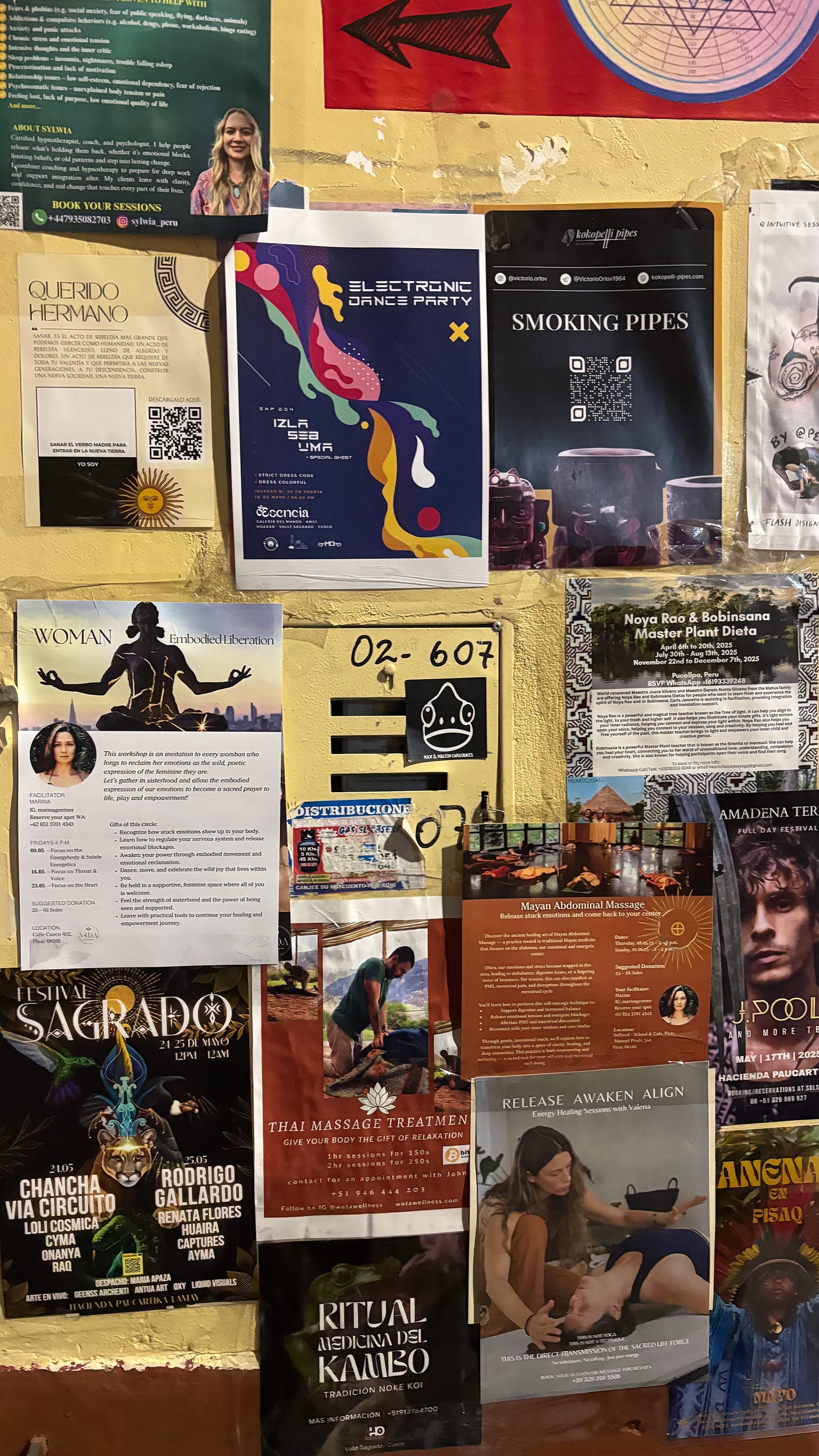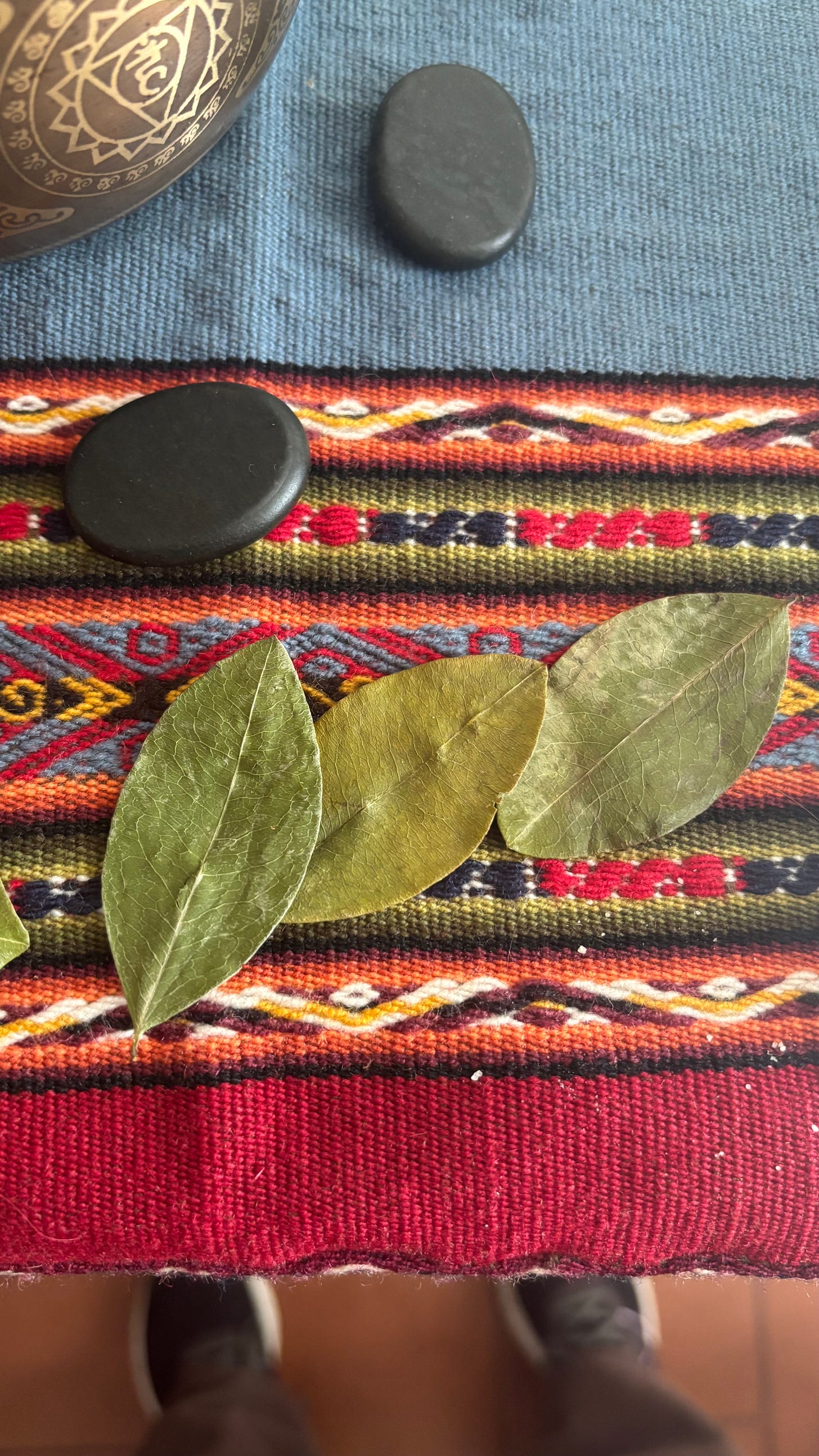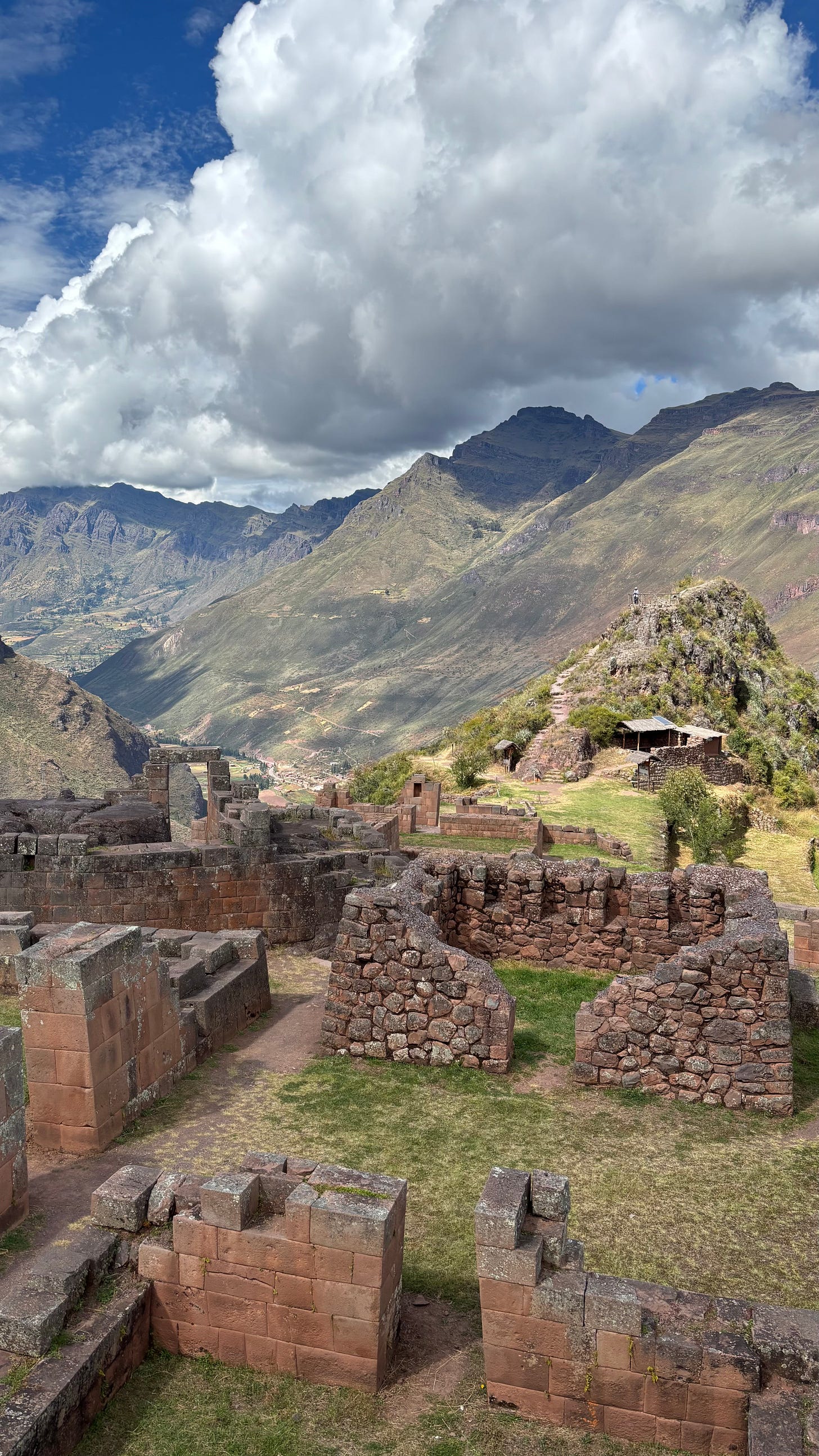Could a coca leaf make us less afraid?
In the hill town of Pisac just 30km outside of Cusco, posters from spiritual therapists line the Inca walls, offering sound healings, San Pedro ceremonies, energy cleansings. The posters feature photos of beautiful people in loose organic clothes, mostly all of them white Europeans, with wild hair and wide eyes. A man in a new age apothecary offers to introduce us to a local shaman. ‘To connect with your ancestors,’ he says. I smile. I don’t tell him that since my mum died this winter, connecting with my ancestors has become a pretty regular occurrence. That last week on the Llactapata trek heading towards Machu Picchu, I had closed my eyes and she was right there, with my grandparents, smiling. Just like those dead Star Wars Jedi who appear to Luke like greenish light holograms.
A few days earlier, we had asked our guide about plant rituals - as it seemed to be the done thing. ‘Ayahuasca is for shamans and tourists,’ he said, bluntly. ‘To speak with Pachamama, you only need coca. It’s not a hallucination. It’s the most sacred plant.’
Coca is as common as sugar here. Bowls of small, green leaves can be found in every roadside cafe and guesthouse lobby, promising an antidote to altitude sickness, headaches and nausea; and 100-times more gentle than its industrialised, class-A derivative, Cocaine. Still, for an adventure, it seems just a little tame, so we look up San Pedro ceremonies on Google anyway. We learn we would need to fast the day before the ritual, in preparation. We have at least three restaurants in Ollantaytambo we want to visit. In the contest between ceviche and mescaline, Peru’s excellent food won the day.
Still, plant ceremonies were on our minds. When the Catholics indoctinated South America with its vicious brand of spiritual colonisation, it activated a separation that still haunts us. God is a man. God is not nature. The divine is not found in the sun, the soil, the wind. God may sit around those things, pulling the strings, but he is, without question, a ‘he’. Fortunately for the Peruvians, the philosophy of animism - of connecting spirit with the land - has continued into the 21st century, albeit in an uneasy alliance with a slew of churches and crosses. But for us? That separation happened long long ago. And so now, in our post-religious, meta crisis era, where so many of us are searching for balance in an unsteady world, plant ceremonies are promising the Western mind a way of restoring the thing our ancestors broke: the possibility of a renewed relationship with her - Mother Nature.
Still, as curious as I am, part of me feels uncomfortable with this new age trend towards the consumption of traditions from other lands - particularly when we are so disconnected from our own. Like those posters on Pisac’s walls, there’s a scent of appropriation - of capitalising on a wisdom tradition with a price tag, an Instagram page, and a suitcase of fashionable clothing. Where in a 4 day ‘intensive’ we can learn just enough to pretend we know a lot; even though the knowledge we seek probably takes a lifetime. I want to swim in my local lake and tell stories about Welsh river goddesses. I want to tend the soil beneath our feet.
And still.
Offering
Up on the mountains above Pisac are some giant pre-colonial ruins that follow the ridgeline for a solid 6km. They’re vast, labyrinthine, so much so that my friends and I quickly lose one another in their corridors. That is until a man around our age appears from behind some fat, Incan brickwork and points me in their direction, and soon we’re hiking as a group. His name is Wayra, which means ‘Wind’ in Quechuan. We track each other up the mountain trail to the sun temple, and he tells us about his village on the far side of the hills, and about the spiritual connection between snakes, pumas and condors, and how his father was a shaman but he wants to become a chef in Cusco. Hours in, he tells us that a year ago, Pachamama granted him the ability to read coca leaves. ‘Would you conduct a coca ceremony for us,’ we ask? He isn’t sure. He would need time to gather the offerings. ‘Later, about 5 o clock?’ We say yes, gratefully.
When Wayra arrives at our hostel, we sit together in a wooden pagoda on pink woven cushions as the sun sets, as he spreads dried coca leaves across a small blanket his mother made. The reading involves him throwing coca leaves to the ground - broken leaves mean we are carrying bad energy, healthy leaves mean we will have good luck.
I have many broken leaves. ‘You are very scared, you have a lot of fear,’ he says. No shit, I think. He throws more coca leaves to the ground and five healthy leaves land in a row. Wayra is happy. ‘It’s ok,’ he says. ‘After the ceremony - no more fear.’ He asks us to blow on the leaves three times and to call on our guides. ‘Who is your Abu?’ He asks. Who is your mountain. We don’t have mountains in London, my friend says, with some embarrassment. ‘Oh.’ Wayra fails to hide the pity in his voice. And then his face brightens, ‘it can be any mountain! Pachamama is all one!’
I tell him the name of a mountain in the Brecon Beacons I have often visited since writing the first draft of my book. It’s a place where local folklore tells of water nymphs and prophecies. He whispers the Welsh words ‘Llyn fan y fach’ into the coca leaves with his strong Quechuan accent, calling to a lake on a mountain 6000 miles away, to ask Mother Nature to heal my fear. I can feel the spirit in my mountain waking up, wondering perhaps why I am so far from home, and why a young man in Peru is calling out her name.
Wayra then packs the coca leaves in a brightly coloured blanket with offerings. Corn. Beans. Quinoa seeds. Gold glitter and bracelet beads. Some broken biscuits and dried flowers. Finally, a green lolly-pop. ‘Pachamama likes candies,’ he says sweetly. He tells us he will take the offering to the mountain at 5am the next morning and leave it in the sunlight at dawn. And then we will feel better.
We leave feeling mostly unsure: did we just participate in some charming act of silliness? Or could a ritual and the force of our own longing be heard and answered in the hills? As it was, when our taxi reached the cold heights of Cusco I was already half asleep, quick to crawl under heavy blankets and let the dreams take me.
Reckoning
The following morning, I ease in and out of wakefulness, indulging in the flow of it, noticing the sunrise. In my dream state, I am in a beautiful bookshop in Somerset called Sherlock and Pages where magical books are often launched into the world. There is an older woman there in a faded yellow T-shirt which matches her grey-bleach wire hair, most of which is pulled back from her face in a messy ponytail. I understand that she is the shop’s owner, and therefore the gatekeeper to the world where my book might be known.
‘Your book is puerile,’ she says with blunt force, without emotion. I am slapped in the face. The imprint of a fist fills out in my abdomen. My resolve is crumbling, my legs are ready to run, to throw my book in the river and never speak of it again.
And then.
I find her in corridor of book shelves. I urge my heart to stay calm, pray for my voice to hold steady.
‘My book is good,’ I say slowly, in monotone, as she turns to face me.
‘It is a quest in search of the lost goddesses of Britain. Their stories have the power to make women strong.’
‘And you think you’re strong now?’ she says, challenging me, brow furrowed, head low, looking at me through her catapillar eyebrows.
‘Yes’, I say, as if it were suddenly obvious. And she nods.
And I wake. Fearless.







